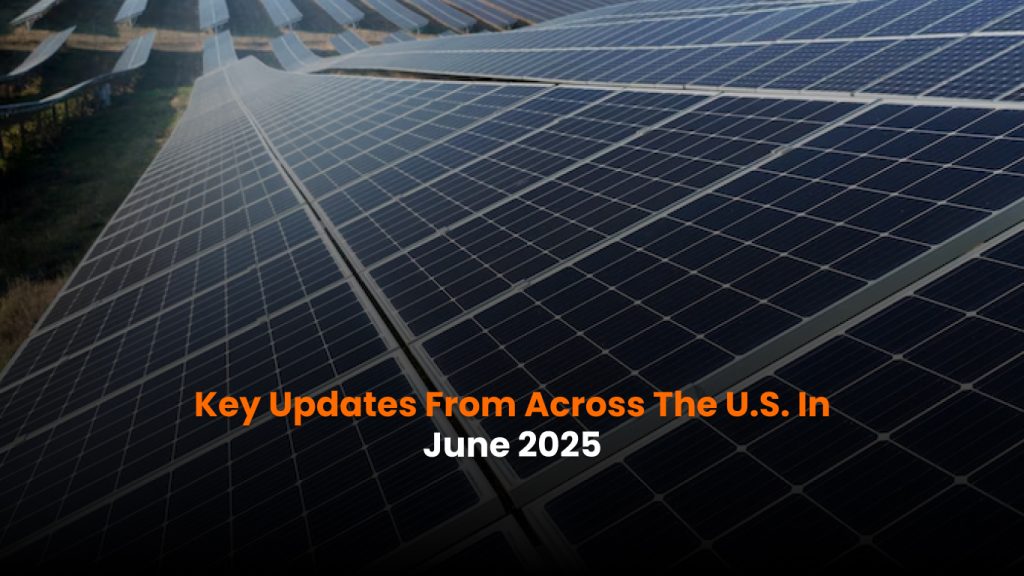Solar Policy June, 2025 – A wave of solar and energy policy developments across the United States this month signals a shifting energy landscape. From California’s potential rollback of net metering benefits to new distributed energy rules in New Jersey, June has brought several major legislative moves and regulatory changes that could have lasting impacts on the solar industry, according to Solar Power World.
California net metering bill moves ahead in state assembly
A controversial bill that could significantly affect rooftop solar sales in California has moved forward in the state legislature. Assembly Bill 942, currently under review, proposes to update net-metering agreements when a solar-powered property is sold. If passed, existing agreements would shift to the state’s latest compensation structure, known as NEM 3.0. Under NEM 3.0, homeowners receive significantly less credit for excess energy exported to the grid. This change could reduce the long-term financial benefits of rooftop solar for new homeowners.
South Carolina energy bill supports both solar + storage and fossil fuel
South Carolina Governor Henry McMaster has signed the South Carolina Energy Security Act (HB 3309) into law, creating a mixed outcome for clean energy advocates. While the law allows for the development of a new gas plant, it also authorizes utilities to expand distributed energy resources. These include customer-side solar plus storage, flexible load programs and support for electric vehicle infrastructure. Although the fossil fuel component has drawn criticism, clean energy stakeholders are encouraged by the progress on distributed energy programs.
Virginia governor greenlights virtual power plant pilot, vetoes storage bill
In early May, Governor Glenn Youngkin approved legislation to launch a 450-megawatt virtual power plant (VPP) pilot through Dominion Energy. The Community Energy Act will allow homes and businesses to aggregate solar panels, energy storage and other distributed resources into a shared energy platform that can enhance grid reliability. However, Youngkin also vetoed two other bills aimed at expanding utility investment in energy storage, drawing mixed reactions from industry observers.
Massachusetts governor proposes clean energy reform with net metering cuts
Governor Maura Healey has introduced new legislation aimed at reforming clean energy procurement. The bill would allow the state to enter direct contracts for renewable energy without requiring utility approval. At the same time, it would reduce net metering compensation for non-residential solar systems, including community solar projects. Industry stakeholders are reviewing the proposal closely, as it could affect the economics of larger solar deployments across the state.
New Jersey streamlines distributed energy interconnection
The New Jersey Board of Public Utilities has approved rule changes designed to modernize the grid and speed up the interconnection process for distributed energy resources (DERs). The updates aim to reduce long delays that solar and storage developers often face when attempting to connect projects to the grid. Officials say the reforms will help support the state’s growing clean energy economy by improving transparency and efficiency.
U.S. House passes budget bill with major solar cuts
The House of Representatives passed a sweeping budget bill in late May that could have damaging consequences for the solar industry. Among the amendments were provisions to eliminate the residential solar Investment Tax Credit (25D), end phase-out schedules for the commercial Investment Tax Credit (48E) and the Production Tax Credit (45Y), and roll back other clean energy incentives. The Senate is expected to begin consideration of the bill following its return from recess on June 2.
High tariffs confirmed on solar products from Southeast Asia
The U.S. International Trade Commission has issued an affirmative ruling in its antidumping and countervailing duty (AD/CVD) investigation of silicon solar cells and modules from Cambodia, Malaysia, Thailand and Vietnam. The Department of Commerce will issue final tariff orders on June 9, and U.S. Customs and Border Protection will begin collecting duties starting June 16. These tariffs are expected to impact the availability and cost of imported solar panels and may lead to delays in project timelines.
Battery anode tariff case delivers unexpectedly low CVD rates
The Department of Commerce has announced preliminary countervailing duty rates in the ongoing trade case involving Chinese battery anode materials. The initial rates were lower than many in the industry had anticipated, providing short-term relief for battery importers. However, the more significant antidumping rates are expected to be released in July, which could bring renewed concerns depending on the findings.
From coast to coast, solar policy remains a dynamic and contested space. While some states are expanding opportunities for solar, storage and grid flexibility, others are facing regulatory rollbacks that could slow progress. Stay tuned as Solar Power World continues to track these developments and their implications for the U.S. clean energy transition.




